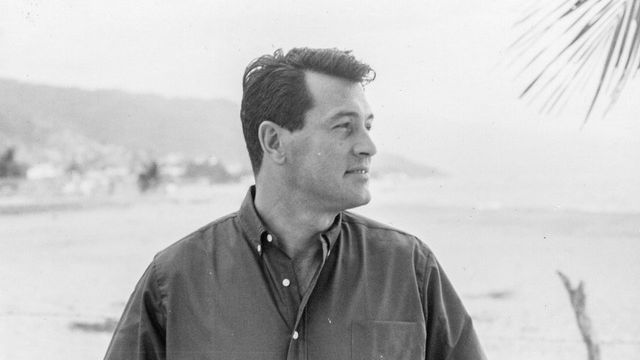Rock Hudson: All That Heaven Allowed
Rock Hudson (AKA Roy Scherer/Fitzgerald) was the heart throb of the 50s and 60s and one of Universal’s top stars.
Known for such diverse movies as Magnificent Obsession, All That Heaven Allows, Written on the Wind, Giant, Pillow Talk, Seconds and of course, the television series Dynasty, he was a luminary in Hollywood.

However, his greatest role was to play Rock Hudson, the ‘straight’ film star, a role that he played for most of his public life, his sexuality only being revealed after his death from AIDS-related complications in 1985.
Rock Hudson: All That Heaven Allowed explores this manufactured image, how it started, and the remarkable double life lived by Hudson, a life that was to end in tragedy.
Near the beginning of the film Hudson relates a dream he had prior to becoming a movie actor in which he is a diamond with pin spots of light emanating. Somewhat prophetic, as his life touched so many people and changed their lives.
Director Stephen Kijak creates this portrait of Hudson’s life both on and off the screen piecing together his story using archival footage and testimonies from some of his closest friends, and what a list it is; Doris Day, Linda Evans, Armistead Maupin, Piper Laurie and many more, including friends, Mark Griffith, Ross Hunter, Douglas Sirk and Allison Anders.
 What makes this documentary/journey special is Kijack’s ability to weave in Hudson movie clips that serve not only as an acting reel, but as a running commentary on Hudson’s complicated life, both on and off screen.
What makes this documentary/journey special is Kijack’s ability to weave in Hudson movie clips that serve not only as an acting reel, but as a running commentary on Hudson’s complicated life, both on and off screen.
There are times however when Kijak overuses the clips as the interviews or testimonials from of actresses Piper Laurie and Kathleen Hughes are only voice overs. Linda Evans (his co-star in Dynasty gives of the most emotional interviews, but sadly, we also never see her. Writer Armistead Maupin (Tales of the City), who plays a key role in Hudson’s ultimate legacy, makes a stronger impression as he is seen.
Rock Hudson: All That Heaven Allowed gives us an in depth look at Hudson’s life from his sexual escapades, pool parties to his backstage squabbles with James Dean. Rather than being salacious, these peeks into Hudson’s private life serve to humanize Hudson. These sorts of details are in short supply, so we are left wanting to know more.
The second half of the film culminates with what Hudson’s death meant to AIDS activism, with Elizabeth Taylor championing the cause even as the Reagan administration stayed largely silent despite Hudson’s friendship with Nancy Reagan and pleas for help.

The film also provides new details concerning Hudson’s troubled relationships with wife Phyllis Gates and boyfriend Marc Christian. And here, for the first time, is an exhaustive exploration of Hudson’s classic films with unprecedented access to private journals, personal correspondence, and production files. Rock Hudson: All That Heaven Allowed pays tribute to the man whose life and death had a lasting impact on American film culture.
The question is, does Rock Hudson; All That Heaven Allowed explore any ongoing issues for the LGBTQIA today? The answer is a resounding yes! While people still find the need to live a ‘double life’, whether it be in the entertainment arts or in fact in any avenue of life, then Rock’s struggle and eventual passing will continue to be an inspiration as a life not lived in vain.
Barry Hill OAM
Subscribe to our E-Newsletter, buy our latest print edition or find a Performing Arts book at Book Nook.

